May 2023 Newsletter
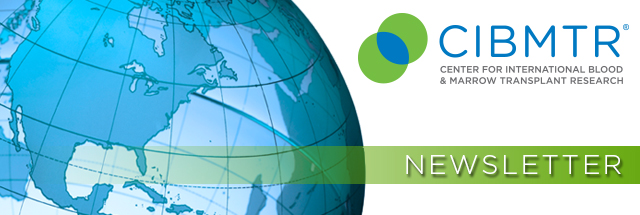
Volume 29, Issue 2
Table of Contents:
Perspectives: Rejection in Blood and Marrow Transplantation
By Michael Verneris, MD
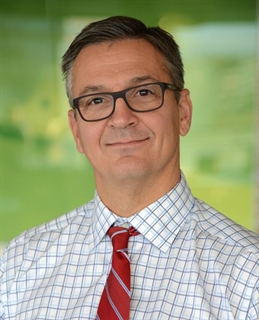 Overcoming the barrier to hematopoietic cell engraftment, though critically important to our practice, is not the subject of this piece but is perhaps a powerful metaphor. The rejection I am contemplating is manifested in the challenges we face as clinical and translational researchers. I was prompted to write about this topic after opening my email this morning and learning that both proposals submitted by junior investigators in my group to the CIBMTR working committees were rejected and will not move forward. This past fall, I encouraged them to submit research proposals, citing their ability to answer important clinical questions, the unparalleled CIBMTR database, and the collegiality of such research. Thinking about how I will counsel these young investigators in the face of this (albeit minor) rejection leads me to reflect upon my own experiences with rejection in the clinic and the research setting.
Overcoming the barrier to hematopoietic cell engraftment, though critically important to our practice, is not the subject of this piece but is perhaps a powerful metaphor. The rejection I am contemplating is manifested in the challenges we face as clinical and translational researchers. I was prompted to write about this topic after opening my email this morning and learning that both proposals submitted by junior investigators in my group to the CIBMTR working committees were rejected and will not move forward. This past fall, I encouraged them to submit research proposals, citing their ability to answer important clinical questions, the unparalleled CIBMTR database, and the collegiality of such research. Thinking about how I will counsel these young investigators in the face of this (albeit minor) rejection leads me to reflect upon my own experiences with rejection in the clinic and the research setting.
I certainly have had my fair share of rejection. Critiques are common and necessary for our field to move forward. The pursuit of new knowledge and innovation requires constant experimentation and a willingness to take risks, which often leads to setbacks, refinement of ideas, and outright failures. Accepting rejection is a crucial part of our job - whether it be associated with a grant, manuscript, or even when a patient asks to be reassigned to another provider. Here are some strategies that I use to deal with rejection in research and clinical medicine:
Rejection as an opportunity for growth. While “recycling” parts of grants, I commonly go back and read the grant that seemed perfect just a few months ago. However, in many instances, it turns out that the ideas were actually not as well developed as I had thought. Likewise, sometimes rejected manuscripts simply need to be reworked to stress the findings in a different manner. Lastly, and perhaps most devastating, is when one of your primary patients asks to be reassigned to another provider. Accepting that sometimes another provider makes a stronger bond with a patient can be humbling, but it happens to all of us, and in the end, remembering that it’s about the patient and not you is most important.
Rejection is not personal. A poor score on a grant, paper rejection, or patient reassignment is typically not a personal indictment, but rather a chance to learn and improve. When a research project doesn't pan out, a manuscript is rejected, or a patient is reassigned, it's important to analyze what went wrong and use that information to make improvements.
Seek feedback from peers and mentors. I received this advice about grant submissions early in my career, but honestly, never pursued this. Grants were always last minute, in retrospect, because I was too insecure to share my work with others until I felt it was perfect, and then it was too late. Developing confidence and comfort in this process is essential. Developing a network of trusted colleagues and mentors who can provide constructive criticism is key.
Persistence and determination. As a medical student, the surgeons taught me the phrase “illegitimi non carborundum” (don’t let the bastards get you down). I use it often to remind myself of those trying times early in my training and to remember that there will always be ups and downs. Success in academic medicine requires thick skin. It also requires persistence, determination, and confidence in your ideas and clinical decisions. With that said, knowing when to ask for help or even when to pivot is also critical.
Maintain a sense of purpose and curiosity. Finally, many of my research ideas start with challenges I encounter in the clinic. Connecting my clinical practice with my clinical and laboratory research maintains my motivation and drive since scientific progress can rapidly make life better for the patients we serve. Admittedly, academic medicine and research are inherently challenging fields and deeply frustrating at times. However, maintaining a sense of purpose for and curiosity about your work is critical and can be an excellent source of inspiration.
Coming back to junior faculty, although I am not exactly sure what I’ll say to those young investigators smarting from the sting of rejection, it will certainly be some version of the above. Rejection is a common experience in academic medicine and research, but it's entirely possible to overcome it with the right mindset and strategies. As researchers and clinicians, we must embrace setbacks, seek feedback, plan, persist, and maintain our sense of purpose.
Health Services and International Studies Working Committee
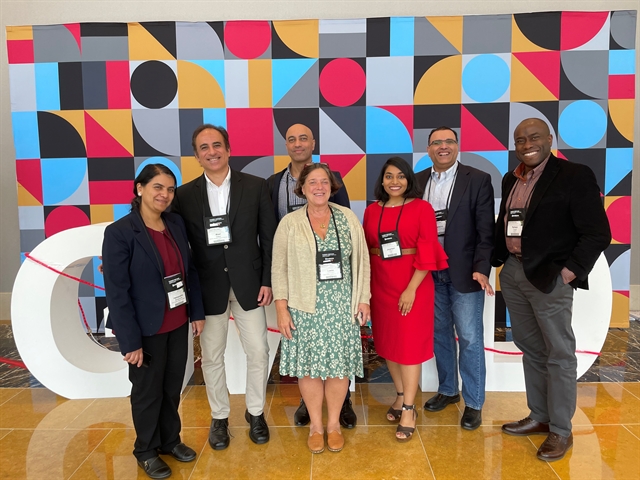
Pictured from left to right: Hemalatha Rangarajan, Wael Saber, Shahrukh Hashmi, Leslie Lehmann, Jinalben Patel, Minoo Battiwalla, Rafeek Yusuf
Committee Leadership
Co-Chairs:
- Shahrukh K. Hashmi (outgoing chair), King Faisal Specialist Hospital, Riyadh, Saudi Arabia
- Hemalatha Rangarajan, Nationwide Children’s Hospital, Columbus, OH
- Leslie Lehmann, Dana-Farber Cancer Institute – Peds, Boston, MA
- Minoo Battiwalla (incoming chair), Sarah Cannon Transplant and Cellular Therapy Program at TriStar Centennial Medical Center, Nashville, TN
Scientific Director:
- Wael Saber (outgoing Scientific Director), CIBMTR MCW, Milwaukee, WI
- Rafeek Yusuf (incoming Scientific Director), CIBMTR NMDP, Minneapolis, MN
Statistical Director:
- Ruta Brazauskas, CIBMTR MCW, Milwaukee, WI
Statistician:
- Jinalben Patel, CIBMTR MCW, Milwaukee, WI
In 2013, CIBMTR’s Health Policy and, Psychosocial Issues Working Committee and the International Studies Working Committee merged to form the Health Services and International Studies Working Committee. The working committee aims to improve the practice and outcomes of HCT through health services research worldwide. This committee brings together a global, enthusiastic, and diverse group of HCT investigators who represent varied clinical and research backgrounds. One of our former co-chairs is the director of an international transplant center and this experience has been invaluable in evaluating studies from low- and middle-income countries. The working committee’s study portfolio includes population-based studies to advance the understanding of health inequities in access and outcomes of HCT. These studies address practice patterns in HCT and the impact of HCT-related variables and social determinants of health not only in survival but on other outcomes, such as cost and healthcare utilization. To complete some of these studies, we not only query CIBMTR’s database but also link it to other large databases both within and outside the United States. In addition, our committee strives to improve the overall quality of registry data by understanding gaps in follow-up.
Our goal is for the committee initiatives to offer a framework and expertise that can help tackle healthcare inequities, surmount barriers, and reduce the existing gaps in access to HCT. The committee is also leading efforts to improve international data collection by working with centers outside of North America. We are currently engaged in several cooperative international studies, thereby fostering global cooperation and partnerships. If you want to tackle an important issue regarding outcomes, healthcare delivery, or global health services research within the HCT arena, join us at the next Tandem Meetings of ASTCT & CIBMTR to see our committee in action.
During the past five years, our committee has published 10 papers that examined various crucial questions surrounding healthcare inequities, quality of life, and their effects on transplant outcomes. These studies have analyzed the impact of different factors, such as neighborhood poverty, pre-transplant marital status, community health status, pre-transplant depression, and access to healthcare in underserved communities. Furthermore, two studies, one on pediatric transplant recipients and another on sickle cell disease HCT recipients, investigated the financial burden and healthcare utilization in transplant recipients by linking with external databases. Additionally, an international study compared the prevalence of GVHD matched sibling donor BMT between North American Caucasian and Japanese populations.
Our current portfolio contains 7 active studies as follows:
- HS16-01: Trends in utilization and outcomes of autologous and allogeneic hematopoietic cell transplantation in racial and ethnic minorities
- HS16-03: Relationship of race/ethnicity and survival after single and double umbilical cord blood transplantation
- HS18-01: International collaborative study to compare the prognosis for acute leukemia patients transplanted with intensified myeloablative regimens
- HS18-02: Racial differences in long term survivor outcomes after allogeneic hematopoietic cell transplantation
- HS19-01: Factors associated with clinical trial participation among HSCT patients: a CIBMTR Analysis
- HS19-03: Haploidentical stem cell transplantation for malignant and non-malignant hematological diseases in patients without sibling donor: a multicenter prospective longitudinal study of the Brazilian bone marrow transplantation study group
- HS19-04: Outcomes after allogeneic stem cell transplants performed in Brazil from HLA-matched siblings, unrelated and mismatched related donors. Retrospective study on behalf of the Brazilian Bone Marrow Transplantation Society (SBTMO), GEDECo (Brazil-Seattle)
The unique strength of our working committee is its collaboration with many societies / organizations in areas of health policy, healthcare delivery, and global health to answer questions not often addressed by other committees. The committee works closely with the Health Services Research Program jointly operated by CIBMTR and NMDP/Be The Match. The Health Services Research Program can facilitate investigator-initiated studies that require expertise and resources beyond those typically needed in CIBMTR studies.
In 2022, we received 9 proposals, 4 of which were presented at the 2023 Tandem Meetings; 1 was accepted as a study. The committee has also partnered with the Brazilian Society of Stem Cell Transplantation to perform joint studies pertaining to HCT related health services in Brazil and other international collaborations are ongoing. We encourage investigators from within the US and globally to bring forth innovative studies to our committee. Our mission is to foster and support studies that will achieve worldwide impact. For more about our committee and to view all our studies, publications, and meeting materials, visit our webpage.
Morbidity, Recovery and Survivorship Working Committee
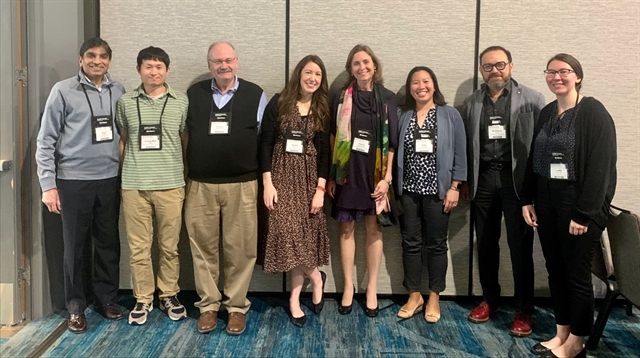
Pictured from left to right: Bipin Savani, Kwang Woo Ahn, Edward Stadtmauer, Rachel Phelan, Hélène Schoemans, Betty Hamilton, Mohamed Sorror, Joelle Strom
Committee Leadership
Co-Chairs:
- Betty Hamilton, Cleveland Clinic Foundation, Cleveland, OH
- Bipin Savani, Vanderbilt University Medical Center, Nashville, TN
- Hélène Schoemans, University Hospital Gasthuisberg, Leuven, Belgium
- Mohamed Sorror, Fred Hutchinson Cancer Center, Seattle, WA
Scientific Director:
- Rachel Phelan, CIBMTR MCW, Milwaukee, WI
Statistical Directors:
- Kwang Woo Ahn, CIBMTR MCW, Milwaukee, WI
- Ruta Brazauskas, CIBMTR MCW, Milwaukee, WI
Statistician:
- Joelle Strom, CIBMTR MCW, Milwaukee, WI
The Morbidity, Recovery and Survivorship Working Committee was formed in 2022 by merging the research and clinical expertise of the former Late Effects and Quality of Life Working Committee and Regimen-Related Toxicity Working Committees. This merger aligned the priorities of both committees and investigators by conducting studies focusing on non-GVHD complications across the spectrum of transplantation and cellular therapies. We take advantage of CIBMTR’s large and representative clinical database to study these early complications and late effects of treatment, which include characterizing specific toxicities as well as understanding which HCT survivors are at greatest risk for the development of these complications. A better understanding of HCT-related early toxicities and late effects is important for improving supportive care and surveillance in clinical practice but also for the development of new strategies associated with low rates of undesirable complications of transplantation, resulting in improvements in recovery and subsequent survivorship.
The committee meets annually in person at the Tandem Meetings, and the co-chairs along with the CIBMTR Scientific Director and statisticians meet monthly by teleconference to ensure the timely completion of projects and reassess priority areas and promote and develop the scientific agenda. Our committee meeting this year in Orlando enjoyed continued strong participation with many in-person and virtual attendees.
A list of the committee’s studies, including recent publications, is provided on the committee’s webpage. The enthusiasm and engagement of the participants in the activities of the former Late Effects and Quality of Life and Regimen-Related Toxicity and Supportive Care Working Committees have been and will continue to be key to the accomplishments achieved by our newly merged committee.
Our extensive portfolio comprises multiple protocols in development, analysis, and manuscripts in preparation. These cover a wide range of topics germane to the care of HCT recipients and long-term survivors. The Morbidity, Recovery and Survivorship Working Committee has also engaged in collaborative efforts between CIBMTR and other organizations, such as the United Network for Organ Sharing (UNOS) and the Childhood Cancer Survivor Study (CCSS).
Additionally, the committee remains involved in other activities, including projects that lead to published reviews targeting areas of post-transplant late effects. These projects have created additional opportunities for junior investigators to become actively involved in our committee. Building on our strong history of international collaboration, we have worked diligently with our EBMT colleagues to develop a process calling for proposals, choosing a pertinent late effects topic, and then conducting a formal systematic review on the chosen topic. Currently, a systematic review focused on female-specific late effects is being initiated, and we are excited to continue this effort moving forward.
Our committee’s success depends on new ideas, testable hypotheses, and the participation of individuals with different perspectives and scientific backgrounds. We seek novel ideas and encourage the involvement of junior investigators interested in outcomes research. We believe early involvement leads to the long-term participation of junior investigators in committee activities.
Before you propose a study, please review the data forms available online to determine if the data are available to answer your question. Since some of the proposed studies may require data across many decades, it is possible the type and way the data was collected also changed with time. Please reach out early if there are any questions regarding data availability.
To learn more about the committee or to discuss your research ideas and proposals, we encourage you to contact one of the members of the Morbidity, Recovery and Survivorship Working Committee leadership team (listed above). We look forward to your participation in upcoming studies and at future Tandem Meetings of ASTCT & CIBMTR!
2023 AcCELLerate Forum
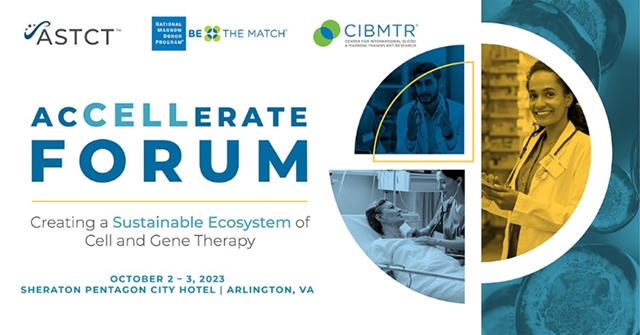
Save the date for the AcCELLerate Forum, which will be held virtually and in person October 2-3, 2023, in Arlington, Virginia. This two-day workshop brings together key stakeholders across the cell and gene therapy field for sessions focused on sustainability and advocacy.
2023 Tandem Meetings

By Alicia Halfmann and Maira Brey
Tandem Meetings | Transplantation & Cellular Therapy Meetings of ASTCT™ and CIBMTR® (Tandem Meetings) are the combined annual meetings of the ASTCT and CIBMTR). Administrators, clinicians, data manager/clinical research professionals, fellows-in-training, investigators, laboratory technicians, MD/PhDs, nurses, nurse practitioners, pharmacists, physician assistants, and other allied health professional attendees benefit from a full scientific program that addresses the most-timely issues in HCT and cellular therapy.
We’re thrilled to announce the 2023 Tandem Meetings hosted the largest audience in Tandem Meetings history, with a total of 5,281 attendees, 72 percent of whom joined us in Orlando!
Program Co-Chairs Sumithira Vasu, MD, and Stefanie Sarantopoulos, MD, PhD, along with the Scientific Organizing Committee, put together an excellent program consisting of 6 plenary sessions and 9 concurrent sessions. The meeting also included 4 breakfast symposia and 5 luncheon symposia, 16 oral abstract sessions, 10 product and innovation theaters, 629 posters with a Meet-The-Authors Reception, 14 CIBMTR Working Committee Meetings and a CIBMTR Collaborative Working Committee Study Proposal Session, 10 ASTCT Spotlight Sessions, and 9 Meet the Professor Sessions. In addition to an outstanding scientific program, Tandem Meetings Tracks were again held for administrative directors, advanced practice providers, pediatrics, BMT CTN coordinators, clinical research professionals / data managers, information technologists and informatics, nurses, and pharmacists.
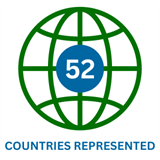 |
 |
 |
 |
 |
Awards
2023 CIBMTR Distinguished Service Award recipient: J. Alejandro Madrigal, MD, PhD
2023 ASTCT Lifetime Achievement Award: Frederick R. Appelbaum, MD
Click here for more information.
Lectures
Mortimer M. Bortin Lecture: Katharina Fleischhauer, MD: Exploiting HLA to Improve Patient Outcomes: Lessons Learned During Half a Century of Transplant Practice
Click here for more information.
E. Donnall Thomas Lecture: Leslie Kean, MD: Targeting GVHD: From the Bench, to the Bedside, to the FDA
Click here for more information.
Networking
There were several networking opportunities offered, including the Tandem Meetings Welcome Reception, the Poster Reception: Meet the Authors, the Tandem Meetings Closing Reception (held outdoors!), and more.
Thank you!
On behalf of the Tandem Meetings of ASTCT & CIBMTR Planning Team, we wish to thank you for all your time, hard work, and dedication to the field; these meetings would not be successful without all of you.
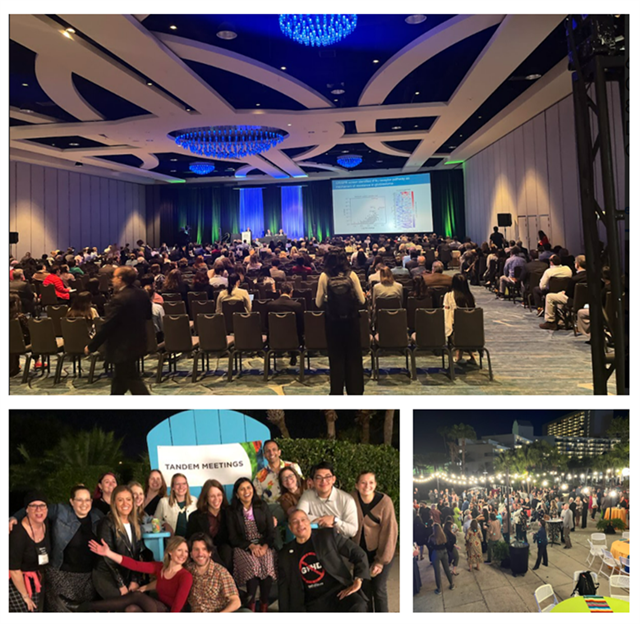
We look forward to seeing you at the Henry B. Gonzalez Convention Center in San Antonio, TX, February 21-25, 2024!
Watch for details about the 2024 Tandem Meetings | Transplantation & Cellular Therapy Meetings of ASTCT and CIBMTR in the coming months. Contact TandemMeetings@mcw.edu for information regarding support opportunities for next year’s meetings.
Join the conversation: #Tandem24
CIBMTR CRO Services: TransIT Study
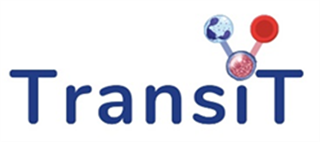
NMDP/Be The Match and CIBMTR are excited to announce opening accrual and the first enrollments to the TransIT Study - A Phase III Randomized Trial Comparing Unrelated Donor Bone Marrow Transplantation with Immune Suppressive Therapy for Newly Diagnosed Pediatric and Young Adult Patients with Severe Aplastic Anemia - protocol NCT05600426! CIBMTR CRO Services will serve as the data coordinating center in collaboration with the Clinical Coordinating Center at Boston Children’s Hospital in partnership with the North American Pediatric Aplastic Anemia Consortium and the PTCTC. The study is funded by the NIH National Heart, Lung, and Blood Institute and is endorsed by the BMT CTN.
Currently, the standard of care for Severe Aplastic Anemia (SAA) in children and young adults mimics that in adults up to age 40. In the absence of a matched related donor for BMT, this includes immune suppressive therapy (IST). Despite improved outcomes in unrelated donor bone marrow transplant (URD BMT) over the past decade, there are no randomized trials to determine whether the standard of care for children and young adults with SAA should be changed. The field is currently in equipoise regarding IST vs. URD BMT for upfront treatment of SAA and needs a randomized trial to define the best initial approach. The study will be the largest-ever randomized trial in pediatric SAA, and its goal is to provide definitive practice-altering conclusions to the field. The study will also provide invaluable detailed health-related QOL data that will help define optimal therapy for patients for the foreseeable future.
Over the next 3-4 years, the study will enroll 234 subjects across more than 50 study sites and follow them for 2 years post-treatment. We anticipate the study results will:
- Compare time from randomization to treatment failure or death from any cause of IST vs. URD BMT when used as initial therapy to treat SAA
- Assess whether health-related quality of life and early markers of fertility differ between the two arms
- Assess the presence of germline marrow failure-related genes and gene mutations associated with MDS or leukemia and the change in gene signatures after treatment in both study arms.
Results from the Pre-TransIT study were published: Pulsipher MA, Lehmann LE, Bertuch AA, et al. A study assessing the feasibility of randomization of pediatric and young adult patients between matched unrelated donor bone marrow transplantation and immune-suppressive therapy for newly diagnosed severe aplastic anemia: A joint pilot trial of the North American Pediatric Aplastic Anemia Consortium and the Pediatric Transplantation and Cellular Therapy Consortium. Pediatric Blood Cancer. 2020 Oct 1; 67(10):e28444
We look forward to working with the study team and study partners to ensure this study is a success!
2023 Tandem Meetings I Transplantation & Cellular Therapy Meetings of ASTCT and CIBMTR: Clinical Research Professionals / Data Management Track
By Jillian Kissinger
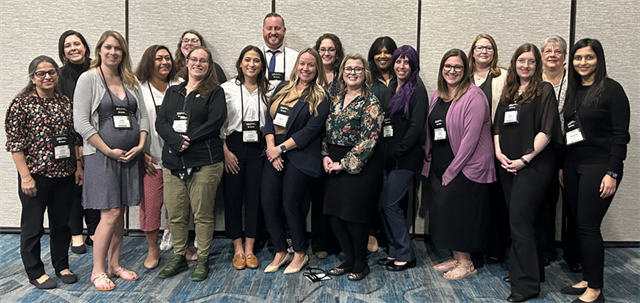
CIMBTR Data Operations staff during the Clinical Research Professionals / Data Management Track
We had a very successful Clinical Research Professionals / Data Management Track at the 2023 Tandem Meetings I Transplantation & Cellular Therapy Meetings of ASTCT and CIBMTR in Orlando, FL. Our hybrid track took place on February 13-14 and was viewed by hundreds of in-person attendees and approximately 350 virtual live stream participants.
Presentation highlights included:
- Form Spotlights on Comorbidities and Non-Malignant Diseases
- Data Operations: A Year in Review
- New Transplant Drugs in 2022
- Lab Module
- Center-Specific Survival Analysis
- Functional area updates from Data Capture, Audit, FormsNet3, and the Data Transformation Initiative.
Additionally, we included two new sessions that were very well received by attendees:
- Excel Tips & Tricks for Data Managers
- Resources for Commonly Submitted CIBMTR Center Support Tickets
We also featured a Best Practice Panel that included presentations in data management from Jaime Kroll from Aurora St. Luke’s Medical Center, Marin Jackson from Stanford University, and Lydia Bachman, BSN, RN, BMTCN, from the University of Cincinnati Medical Center. These data managers presented their various best practices, including incorporating data coordinators into patient clearance, how to build and structure a data management team, and creating an onboarding program to produce competent and confident data managers.
Madhu Ragupathi, MD, from Baylor University Medical Center, received this year’s award for best oral abstract for his presentation titled, “Establishing a Routine 30-Day Review of Clinical Documentation to Improve Graft-Versus-Host Disease (GvHD) Reporting in the 1st Year after Allogeneic Transplant.”
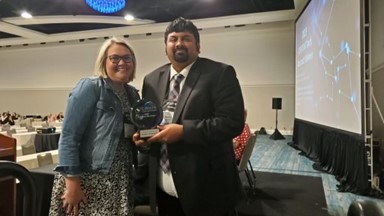
Best Oral Abstract recipient, Madhu Ragupathi, MD, poses for a photo with Eileen Tuschl, CIBMTR MCW Data Operations Director
Additional oral abstracts included:
- Internal Auditing Process for an AGNIS-Enabled Database – presented by Taylor Macioci, Dana-Farber Cancer Institute, Boston, MA
- Made us Stronger – presented by Nicolette M. Minas, MS, CCRP, and Kathleen Ruehle, RN, BMT-CN, University of Maryland Medical Center, Baltimore, MD
Presentation slides from the 2023 Clinical Research Professionals / Data Management Track are available on the CIBMTR Portal > Training & eLearning Tile > Tandem Meetings CRP/ DM Track. Recordings will also be posted here in the coming months.
We extend a special thank you to all who completed their evaluations! We use these data to improve our meetings and make these sessions as meaningful and impactful as possible. We look forward to seeing you next year in San Antonio, TX!
Publicly Available Datasets
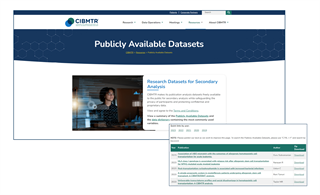 UPDATED: View a summary of the Publicly Available Datasets and the data dictionary containing the most commonly used variables.
UPDATED: View a summary of the Publicly Available Datasets and the data dictionary containing the most commonly used variables.
In accordance with the NIH Data Sharing Policy and NCI Cancer Moonshot Public Access and Data Sharing Policy, CIBMTR makes the final datasets from published studies publicly available on CIBMTR’s Research Datasets for Secondary Analysis webpage. These publication analysis datasets are freely available to the public for secondary analysis.
While providing these data, CIBMTR is committed to safeguarding the privacy of participants and protecting confidential and proprietary data. Upon accessing the datasets page on CIBMTR’s public website, the viewer is notified that the dataset was collected by CIBMTR, and CIBMTR’s supporters are listed. The webpage also clearly notes the terms and conditions of dataset usage.
NEW datasets are now available online.
Share Your Research in Plain Language
By Jennifer Motl
These new plain-language summaries of CIBMTR research may help your patients:
 |
Medicine may protect digestive organs after transplant Read more: |
 |
Long-term effects common after BMT in childhood Read more: |
Find more summaries on the Study Summaries for Patients webpage.
Our Supporters
CIBMTR is supported primarily by Public Health Service U24CA076518 from the National Cancer Institute (NCI), the National Heart, Lung and Blood Institute (NHLBI) and the National Institute of Allergy and Infectious Diseases (NIAID); U24HL138660 and U24HL157560 from NHLBI and NCI; U24CA233032 from NCI; OT3HL147741 from NHLBI; HHSH250201700006C, 75R60222C00008, 75R60222C00009 and 75R60222C00011 from the Health Resources and Services Administration (HRSA); and N00014-21-1-2954 and N00014-23-1-2057 from the Office of Naval Research.
Additional federal support is provided by P01CA111412, R01CA100019, R01CA152108, R01CA218285, R01CA231141, R01CA231838, R01CA262899, R01AI128775, R01AI150999, R01AI158861, R01HL155741, UM1CA121947, U01AI069197, U01AI126612, U01HL128568, UG1HL069254.
Support is also provided by Be the Match Foundation; Boston Children’s Hospital; Dana Farber; Gateway for Cancer Research, Inc.; PBMTF; Stanford University; Medical College of Wisconsin; National Marrow Donor Program; and from the following commercial entities: AbbVie; Actinium Pharmaceuticals, Inc.; Adaptimmune; Adaptive Biotechnologies Corporation; ADC Therapeutics; Adienne SA; Allogene; Allovir, Inc.; Amgen, Inc.; Angiocrine; Anthem; Astellas Pharma US; Atara Biotherapeutics; BeiGene; bluebird bio, inc.; Bristol Myers Squibb Co.; CareDx Inc.; CRISPR; CSL Behring; CytoSen Therapeutics, Inc.; Elevance Health; Eurofins Viracor, DBA Eurofins Transplant Diagnostics; Gamida-Cell, Ltd.; GlaxoSmithKline; HistoGenetics; Incyte Corporation; Janssen Research & Development, LLC; Janssen/Johnson & Johnson; Jasper Therapeutics; Jazz Pharmaceuticals, Inc.; Karius; Kiadis Pharma; Kite, a Gilead Company; Kyowa Kirin; Legend Biotech; Magenta Therapeutics; Mallinckrodt Pharmaceuticals; Medexus Pharma; Merck & Co.; Mesoblast; Millennium, the Takeda Oncology Co.; Miltenyi Biotec, Inc.; MorphoSys; Novartis Pharmaceuticals Corporation; Omeros Corporation; Orca Biosystems, Inc.; Ossium Health, Inc.; Pfizer, Inc.; Pharmacyclics, LLC, An AbbVie Company; Pluristem; PPD Development, LP; Regimmune; Sanofi; Sanofi-Aventis U.S. Inc.; Sobi, Inc.; Stemcyte; Takeda Pharmaceuticals; Talaris Therapeutics; Vertex Pharmaceuticals; Vor Biopharma Inc.; Xenikos BV.
